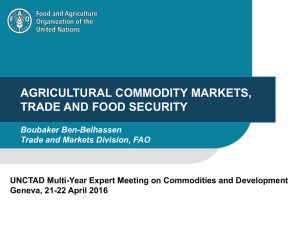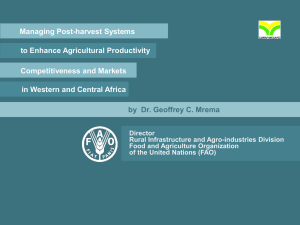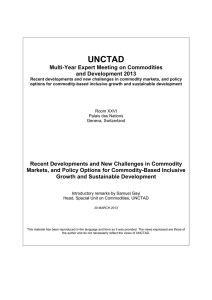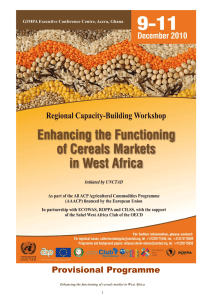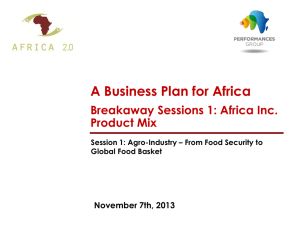Enhancing the functioning of cereals markets in West Africa
advertisement
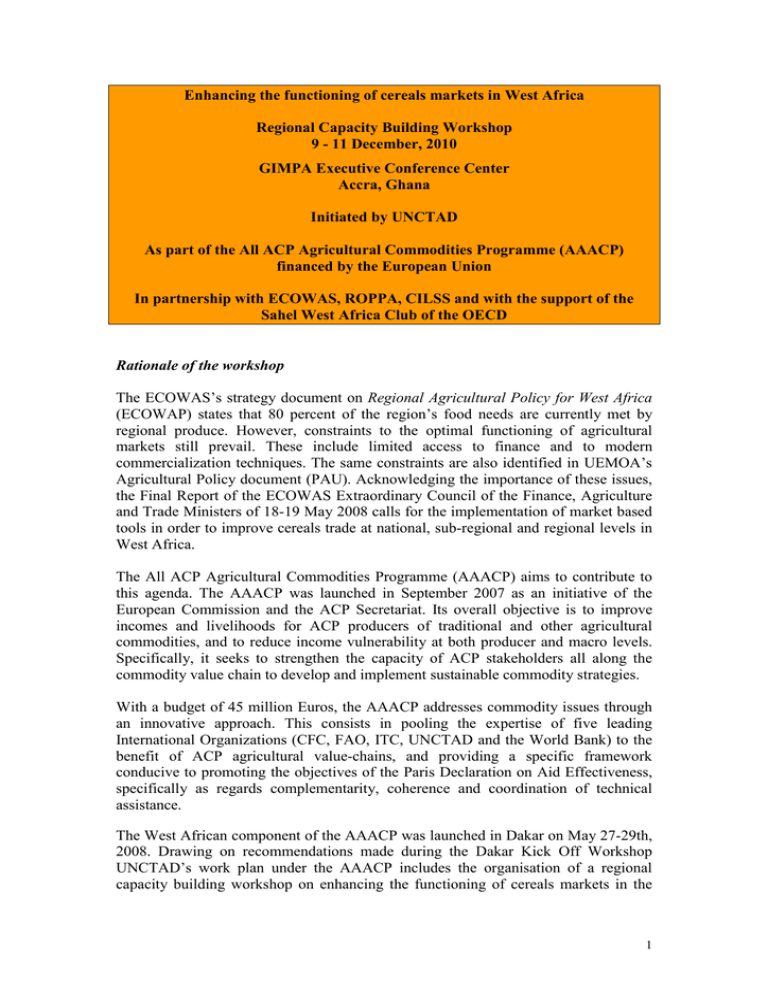
Enhancing the functioning of cereals markets in West Africa Regional Capacity Building Workshop 9 - 11 December, 2010 GIMPA Executive Conference Center Accra, Ghana Initiated by UNCTAD As part of the All ACP Agricultural Commodities Programme (AAACP) financed by the European Union In partnership with ECOWAS, ROPPA, CILSS and with the support of the Sahel West Africa Club of the OECD Rationale of the workshop The ECOWAS’s strategy document on Regional Agricultural Policy for West Africa (ECOWAP) states that 80 percent of the region’s food needs are currently met by regional produce. However, constraints to the optimal functioning of agricultural markets still prevail. These include limited access to finance and to modern commercialization techniques. The same constraints are also identified in UEMOA’s Agricultural Policy document (PAU). Acknowledging the importance of these issues, the Final Report of the ECOWAS Extraordinary Council of the Finance, Agriculture and Trade Ministers of 18-19 May 2008 calls for the implementation of market based tools in order to improve cereals trade at national, sub-regional and regional levels in West Africa. The All ACP Agricultural Commodities Programme (AAACP) aims to contribute to this agenda. The AAACP was launched in September 2007 as an initiative of the European Commission and the ACP Secretariat. Its overall objective is to improve incomes and livelihoods for ACP producers of traditional and other agricultural commodities, and to reduce income vulnerability at both producer and macro levels. Specifically, it seeks to strengthen the capacity of ACP stakeholders all along the commodity value chain to develop and implement sustainable commodity strategies. With a budget of 45 million Euros, the AAACP addresses commodity issues through an innovative approach. This consists in pooling the expertise of five leading International Organizations (CFC, FAO, ITC, UNCTAD and the World Bank) to the benefit of ACP agricultural value-chains, and providing a specific framework conducive to promoting the objectives of the Paris Declaration on Aid Effectiveness, specifically as regards complementarity, coherence and coordination of technical assistance. The West African component of the AAACP was launched in Dakar on May 27-29th, 2008. Drawing on recommendations made during the Dakar Kick Off Workshop UNCTAD’s work plan under the AAACP includes the organisation of a regional capacity building workshop on enhancing the functioning of cereals markets in the 1 ECOWAS Region. The purpose of this concept note is to outline the rationale, objectives, target beneficiaries and methodology of the workshop. Coherence and partnerships The workshop is organised in line with the principles of coherence and of coordination as stated in the Paris Declaration on Aid Effectiveness. The alignment principle was fulfilled in the effort to situate the workshop’s purpose within regional policy initiatives. In this spirit, consultations were held with ECOWAS, UEMOA, CILSS and ROPPA and other civil society organisations. As a result of this consultative process, the workshop is held under the auspices of ECOWAS and in collaboration with ROPPA and CILSS. ITC contributed to the financing of participants and speakers as part of the AAACP. Other development partners who contributed to the sponsoring of speakers are as follows: FAO (AAACP), AFD, USAID and UNECA. Objectives of the workshop The general objective of the Workshop is to reinforce the capacity of public and private stakeholders so as to enhance the functioning of cereals markets in West Africa. More specifically, the workshop aims to achieve the following objectives: • • • • • Highlighting the relevance of increased access to markets and financing for the better functioning of cereals markets in West Africa and for achieving food security. Exchange of information and stock-taking of regional experiences in relation to agricultural commodities exchanges and warehouse receipts systems. Awareness raising among regional and national stakeholders in relation to the issues, benefits, constrains and conditions that are necessary for the development and use of these instruments. Identification of public policy recommendations to regional organisations, other public stakeholders and development partners on necessary conditions that ought to be met for the successful development of these mechanisms. Identification of recommendations to private stakeholders concerning practices and pre-conditions for the successful use of these tools. Although focusing on cereals, it is expected that the outcome of the workshop will be of value to most agricultural markets in the region, and that lessons learned might thus make a contribution to improving marketing of these other agricultural products. Methodology The first session of day 1 is devoted to situating the meeting in the overall regional policy context. The remainder of the first day will focus on warehouse receipt systems (warrantage). Day 2 will focus on commodity exchanges. Each session will begin with a review of the regional experience, and 3 to 4 presentations of country cases focusing on different themes. These presentations will be followed by working group 2 sessions on the way to use and promote these instruments in the region. The conclusions of the group discussions will then be presented and discussed in plenary. Group discussions will focus on the following themes: • Warehouse receipt systems/warrantage and the development of an appropriate legal and regulatory framework: the role of governments, private institutions and regional organizations. • Implementation of warehouse receipt systems/warrantage: role of practitioners (financial institutions, warehouse managers, farmers organizations etc.). • Identification of synergies between different actors: promotion of warehouse receipt systems, warrantage and implications for food security in West Africa. • Commodity exchanges: Role of a legal framework at the national and regional levels. • Role of warehouses and quality standards in the creation of commodity exchanges. • The challenge of targeting smallholders: the role of different actors. Target beneficiaries The meeting is expected to bring together all key stakeholders in the cereals industry. There will be representatives of regional economic organisations, national food security boards, producers' associations, traders, distributors, bankers and other financial institutions as well as development partners interested in the promotion of commodity exchanges and warrantage. A total of approximately 100 participants are expected to attend. Dates and location of the workshop: 9-11 December 2010, Accra, Ghana In line with the principle of better coordination of development activities, the workshop will be held back-to-back with the OECD’s Sahel and West Africa Club’s forum on Regional Solidarity to Address Food Crises: South-South Cooperation and Regional aid Effectiveness to which UNCTAD is also contributing. Outcomes of the forum will be presented during the meeting on 09 December thus allowing its purpose to be situated within the broader framework of South-South cooperation. 3
